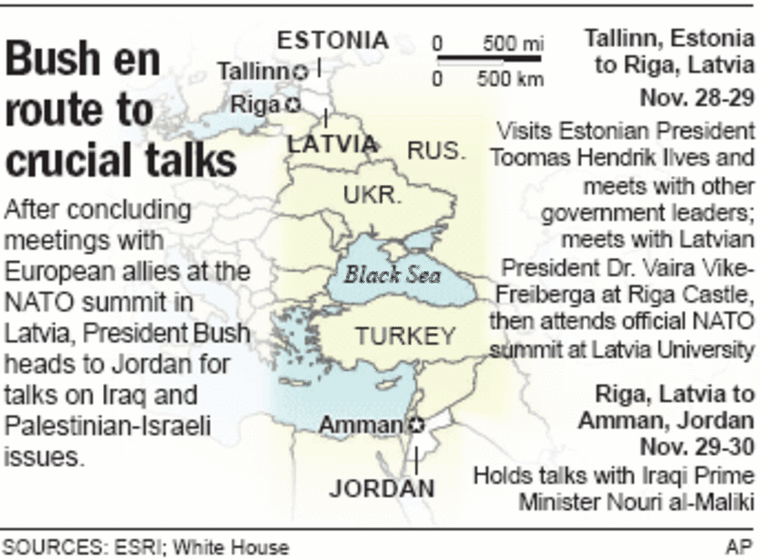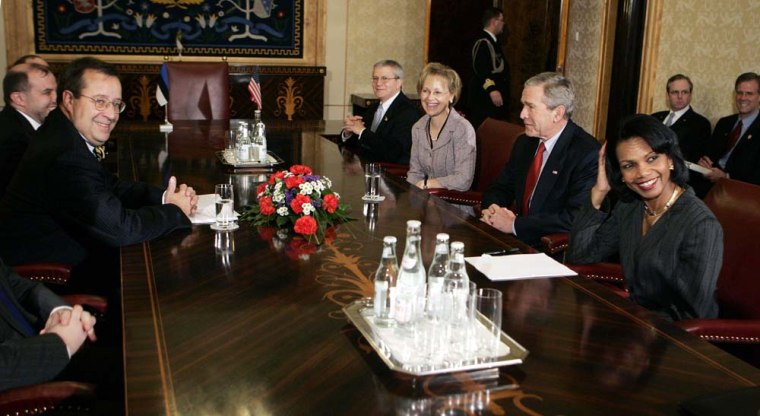The United States will not withdraw its forces from Iraq before its mission of building a stable democracy is complete, President Bush said Tuesday.
“There is one thing I’m not going to do. I am not going to pull our troops off the battlefield before the mission is complete,” Bush said in a keynote speech at the University of Latvia just before a summit of the NATO defence alliance.
He said Washington would continue to be flexible and make the necessary changes in its tactics to deal with sectarian violence.
Bush’s Baltic visit was part of intensified diplomatic efforts to quell rising violence in Iraq and Afghanistan.
‘No question it’s tough’
Addressing the conflict rocking Iraq, he said recent violence is part of an al-Qaida plot to goad Iraqi factions into repeated attacks and counterattacks.
“No question it’s tough, no question about it,” Bush said at a news conference with Estonian President Toomas Hendrik Ilves. “There’s a lot of sectarian violence taking place, fomented in my opinion because of the attacks by al-Qaida causing people to seek reprisal.”
Bush, who travels to Jordan later in the week for a summit with Iraqi Prime Minister Nouri al-Maliki, said the latest cycle of violence does not represent a new era in Iraq. The country is reeling from the deadliest week of sectarian fighting since the war began in March 2003.
“We’ve been in this phase for a while,” Bush said.
The president dated the current spike in violence to the Feb. 22 bombing of a sacred Shiite shrine in Samarra, which triggered reprisal attacks between Shiites and Sunnis and raised fears of civil war.
Reviews of how to alter the Iraq strategy are underway within the administration, even as a bipartisan panel, led by former Secretary of State James Baker III and former Rep. Lee Hamilton, D-Ind., is completing the recommendations it is expected to present to Bush next month.
Role of Iran, Syria
Bush said he will ask al-Maliki to explain his plan for quelling the violence.
“The Maliki government is going to have to deal with that violence and we want to help them do so,” the president said. “It’s in our interest that we succeed.”
Directly seeking help from Iran and Syria with Iraq, as part of new, aggressive diplomacy throughout the region, is expected to be among the recommendations of the Baker-Hamilton group.
But Bush continued to express his administration’s reluctance to talk with two nations it regards as pariah states working to destabilize the Middle East.
Iran, the top U.S. rival in the region, has reached out to Iraq and Syria in recent days — an attempt viewed as a bid to assert its role as a powerbroker in Iraq.
Bush said Iraq is a sovereign nation, free to meet with its neighbors. “If that’s what they think they ought to do, that’s fine,” he said. “One thing Iraq would like to see is for the Iranians to leave them alone.”
The president added that the U.S. will only deal with Iran when they suspend their program of enriching uranium, which could be used in a nuclear weapon arsenal.
“The Iranians and the Syrians should help — not destabilize — this young democracy,” he said.
Iranian influence?
The New York Times on Monday quoted a senior U.S. intelligence official who said the Iranian-backed Hezbollah had been providing training for the Mahdi Army, the Iraqi Shiite militia led by anti-American cleric Muqtada al-Sadr. The anonymous official told the Times that 1,000 to 2,000 Shiite fighters had been trained in Lebanon by Hezbollah, also backed by Syria.
U.S. officials have previously accused Iran of military interference in Iraq.
Meanwhile, Iran’s supreme leader Ayatollah Ali Khamenei accused the United States of destabilizing Iraq through hired “terrorists” and former members of Saddam Hussein’s regime.
In a meeting with Iraqi President Jalal Talabani, Khamenei pledged that Iran would do all it can to use its influence among Iraq’s Shiite Muslims to quell the violence, according to a state television report.
“The main reason for the current situation in Iraq is America’s policies,” the television quoted Khamenei as telling Talabani, who is on the final day of a two-day visit.
“Those (the Americans) who plotted against Iraq, and whose plans have not materialized, are intent on destabilizing the situation. Their agents on the ground are terrorists, the excommunicated and former Baathists,” the television quoted Khamenei as saying.
NATO members pressed on Afghanistan
Estonia, a former Soviet republic being rewarded as an anti-terror ally, was Bush’s first stop en route to a NATO summit in neighboring Latvia where discussion will focus on the tens of thousands of alliance troops clashing in Afghanistan with insurgents, particularly in the south where the Taliban is resurgent.
Bush said in the news conference that NATO “members must accept difficult assignments if we expect to be successful.” It was an apparent reference to the fact that only a handful of countries — primarily the U.S., Britain and the Netherlands — are doing much of the heavy lifting in the dangerous southern areas.
Some U.S. officials have openly hinted that Germany, for instance, which is now deployed in relatively stable northern areas, should move troops to the south. Thus far, however, Germany has balked at such suggestions.
An issue of high concern in central and eastern European countries is their lack of participation in a U.S. visa waiver program that allows business travelers and tourists to enter the U.S. for months using only a passport. Ilves said it is something his country “constantly has been raising” with the United States.
Bush promised to try to convince Congress to add more countries, like Estonia, to the program by adding new security elements to overcome wariness in the aftermath of the Sept. 11, 2001, attacks.
“It’s in our nation’s interest that people be able to come and visit,” the president said.
On Iraq, Jordan’s King Abdullah, who is hosting al-Maliki’s meeting with Bush, has warned that unless bold steps are taken urgently, the new year could dawn with three civil wars in the Mideast — with one in Iraq added to those in Lebanon and between the Palestinians and Israelis.
But Bush, dodging a direct answer of whether civil war exists or not, tied the three conflicts together in a different way. He said that recent strife in Lebanon and the heated up Israeli-Palestinian dispute are, like Iraq, the result of extremists trying to choke off democratic progress.

“When you see a young democracy beginning to emerge in the Middle East, the extremists try to defeat its emergence,” Bush said. “Extremists attack because they can’t stand the thought of a democracy. And the same thing is happening in Iraq.”
Praise for Estonia
Bush, the first sitting U.S. president to visit Estonia, was welcomed to this small Baltic country with a daybreak ceremonial welcoming at Kadriorg Palace, the official residence and working office of the president of Estonia.
Bush also met with Estonian Prime Minister Andrus Ansip, praising him for “your economic accomplishment and your contributions to peace and liberty around the world.”
The U.S. president met democracy activists and Estonian soldiers who have served on foreign missions.
After lunch, Bush was departing this medieval capital for Latvia.
Both Estonia and Latvia are strong U.S. allies, with forces in both Iraq and Afghanistan.
Unlike in most of Europe, there is hardly any public criticism here of Bush’s administration or the Iraq war. A small protest by anarchists was planned in Tallinn on Tuesday but was not expected to cause any major disruption.
